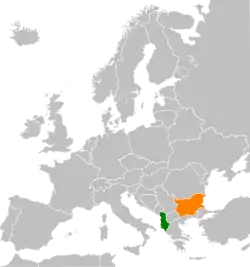Albania–Bulgaria relations
Albania–Bulgaria relations are current and historical relations of Albania and Bulgaria. Diplomatic relations between Albania and Bulgaria were established in 1922. The Albanian Embassy of Bulgaria is in Sofia, and the Bulgarian Embassy is in Tirana.
 | |
Albania |
Bulgaria |
|---|---|
As a European Union (EU) member, Bulgaria supports Albania's bid for membership of the EU.[1]
History
.jpg.webp)
The territory of modern Albania was part of the Bulgarian Empire during certain periods in the Middle Ages. Most of Albania became part of the First Bulgarian Empire in the early 840s during the rule of Khan Presian. Some coastal areas, such as the town of Durrës, remained under Byzantine control during this time. The Byzantines gradually conquered the remainder of Albania with the decline of the First Bulgarian Empire, taking the last mountain fortresses in 1018–1019. During Byzantine rule, Albania became the center of a major, albeit unsuccessful, Bulgarian uprising.
The last Bulgarian Emperor to govern the whole territory was Ivan Asen II (1218–1241) of the Second Bulgarian Empire. The decline of Bulgaria continued and the country lost its last fortresses in Albania under Constantine Tikh Asen (1257–1277).
Albanians in Bulgaria
Albanians (Bulgarian: албанци, albantsi) are presently a minority ethnic group in Bulgaria (Albanian: Bullgaria). Although once a larger population, there were only 278 Albanians recorded in the 2001 Bulgarian Census.[2]) Between the 15th and 17th century, some groups of Albanians (both Roman Catholic and Eastern Orthodox) settled in many parts of modern northern Bulgaria, along with a smaller group settled in southern Thrace.
See also
References
- "About Us". Tirana: Bulgarian Ministry of Foreign Affairs. Retrieved 14 May 2017.
- "Етнически малцинствени общности" (in Bulgarian). Национален съвет за сътрудничество по етническите и демографските въпроси. Archived from the original on 2013-03-22. Retrieved 2007-02-18.

